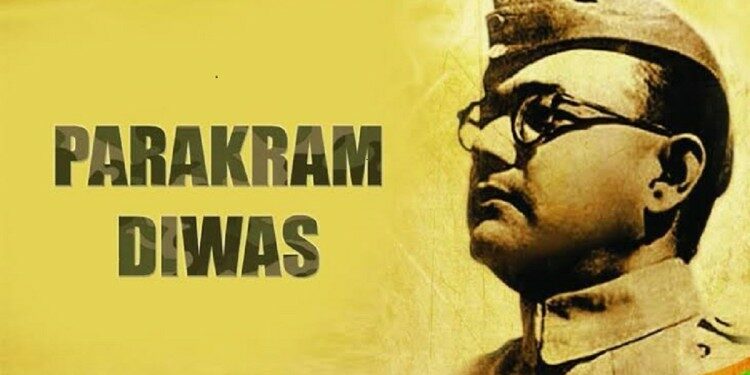In news- Recently, the Union Government has declared 23rd January as Parakram Diwas to commemorate the 125th birth anniversary of Netaji Subhas Chandra Bose.
About Parakram Diwas-
Government of India has decided to celebrate his birthday on the 23rd day of January every year as “PARAKRAM DIWAS” to inspire people of the country, especially the youth, to act with fortitude in the face of adversity as Netaji did, and to infuse in them a spirit of patriotic fervour.
Govt of India has approved various proposals relating to the 125th birth anniversary of Netaji:
- Inaugural function of 125th birth anniversary of Netaji Subhas Chandra Bose was organized at Victoria Memorial Hall, Kolkata on 23rd January 2021.
- A High Level Committee under the chairmanship of Hon’ble Prime Minister has been constituted for the commemoration.
- Netaji Subhas Chandra Bose Museum has been set up at Red Fort New Delhi.
- In the ceremony, a book based on Netaji’s letters called “Book: Letters of Netaji (1926-1936)” was also unveiled.
About Netaji Subhas Chandra Bose-
- He was born on 23 January 1897 in Cuttack, in what is today the state of Odisha in India.
- He did B A in Philosophy from the Presidency College in Calcutta.
- He found Britishers’ insults to Indians in public places as offensive.
- In December 1921, Bose was arrested and imprisoned for organising a boycott of the celebrations to mark the Prince of Wales’s visit to India.
- Bose left for England in 1919 to appear for Indian Civil Service Examination.
- Bose returned to India as he resigned from his civil service job in April 1921, and later joined the Indian National Congress to fight for the independence of India.
- In 1923, Bose was elected as the President of All India Youth Congress and as the Secretary of Bengal State Congress.
- By December 1927, Bose was appointed as the General Secretary of the INC.
- By 1938, he presided over the Haripur session.
- However, due to his strong differences with Mahatma Gandhi and Jawaharlal Nehru, he resigned in 1939.
- During the Second World War, Bose revived the Indian National Army (INA) with the help of the Imperial Japanese Army, and also founded an Indian Radio Station called ‘Azad Hind Radio’.
- In Europe, S C Bose sought help from Adolf Hitler and Benito Mussolini for the liberation of India.
- S. C. Bose was founder and President of the All India Forward Bloc, and founder and Head of State of the Provisional Government of Free India, which he led alongside the Indian National Army from 1943 until his demise in 1945.
- He started the newspaper known as ‘Swaraj’, and was also editor of the newspaper called ‘Forward’, founded by his mentor Chittaranjan Das.
- In 1934, he wrote the first part of his book ‘The Indian Struggle’, which was about nationalism and India’s independence movement during 1920–1934, but the British government banned the book.
Following Institutions have been named after him-
- Netaji Subhas University, Pokhari, Jamshedpur.
- Netaji Subhas Open University, Kolkata.
- Netaji Subhas University of Technology, New Delhi.
- Netaji Subhas National Institute of Sports, Patiala.
















